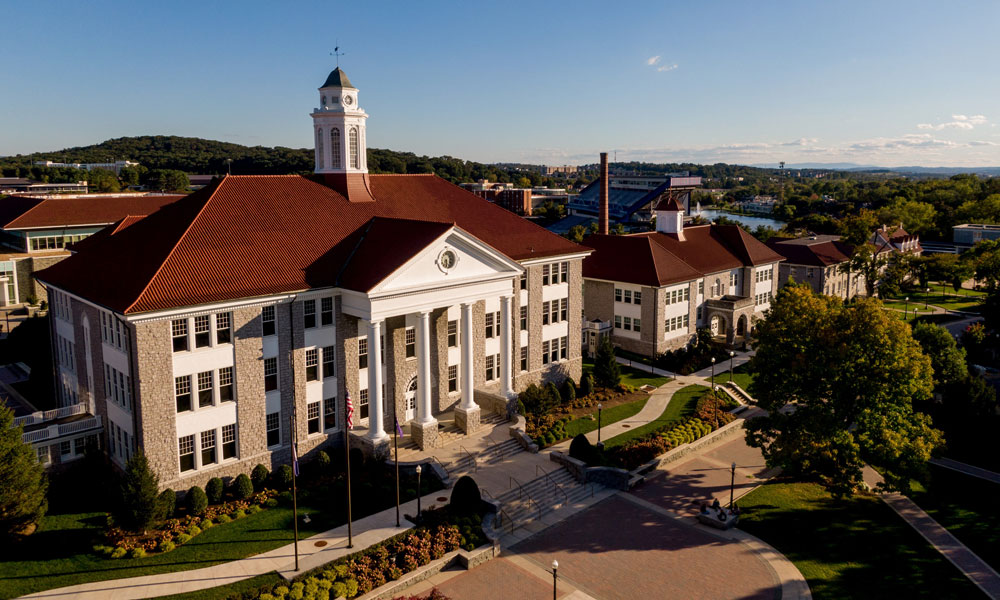Undergraduate Student Research is Going Viral
Office of the Provost
In the words of anthropologist and author Zora Neale Hurston, “research is formalized curiosity. It is poking and prying with a purpose.” Though we may not realize it, JMU is actually one of the few universities that truly encourages undergraduate students to participate in scientific research. With state of the art facilities, hands-on lab courses, and journals dedicated solely to undergraduate research, JMU actively seeks to give its students real experience in all of the sciences. A group of biology, biotechnology, and ISAT students, who go by the name “SuperPhages,” exemplify the school’s dedication to engaging young scientists. These are the students who choose to continue their research beyond the Viral Discovery Program, a course focused on providing freshmen with real independent research experience and skills.
The Viral Discovery and SuperPhage Programs are research efforts designed to study the possibilities of viruses that kill bacteria, also known as “bacteriophages,” or “phage” for short. “We call the Viral Discovery Program students the PhageHunters,” explains Dr. Louise Temple, one of the originators of the course. “The students have a great time, they learn a lot, it’s easy, fun, and exciting.”
If these students choose to continue to do phage research beyond their freshmen year, they are called SuperPhages. While the Viral Discovery Program is a nationwide effort, with around 80 participating schools including the University of Virginia and Virginia Commonwealth University, the SuperPhage continuation is unusual. “We do this for an educational experience,” Temple said. “I do [the SuperPhage Program] to meet the needs of the students.”
These phages work by infecting a host bacteria cell, taking over the cell’s machinery to make new viruses, and finally making proteins that break the cell wall. Several questions are then asked and tackled by these SuperPhage student researchers. Could these bacteriophages be used to replace antibiotics? More than replacing antibiotics, could these phages be used to treat crops and farm animals suffering from costly pathogens? Could the proteins that break the bacteria’s cell walls be isolated and used instead of the whole virus? What about using these phages as an inexpensive alternative diagnostic tool?
These young scientists are tasked with either looking for new phages to solve a specific problem area, such as a pathogen infecting livestock, or they are looking at the genes of known phages to see if they can isolate the cell-breaking protein. “The students know how to do this research because they did it as freshmen, but it’s a lot more sophisticated,” said Temple. “There’s a lot more to it.”
Currently there are four groups of SuperPhages each consisting of two to three students. The groups have a specific topic they are researching including research on the STI-causing bacteria Neisseria gonorrhoeae and Bacillus diseases like food poisoning. One group is even looking at the possibilities of using Bordetella avium, a bacteria that infects turkeys with a disease much like whooping-cough, as a potential diagnostic tool.
Another example of research conducted by a group of SuperPhages includes looking at the work of students Christopher Lien, Alexander Clare, and Christopher Langouet, who studied the plant pathogen Pseudomonas syringae. This soil bacterium infects and harms plants like tomatoes, tobacco, and beans by secreting an Ice Nucleation Active (INA) protein that causes the plants to become damaged easily by ice. “This has significant agricultural importance,” explained Lien. “The bacterium damages crops and causes millions of dollars in losses.” As SuperPhages, the students’ task included isolating a phage particle from the soil and testing to see if it would infect and kill the target bacterium, P. syringae.
“The majority of undergraduates never get the chance to engage in research and it’s disheartening,” said Lien. “Not only are they missing out on valuable knowledge, they’re also being sent out into the world with little to no experience.” While some universities may shy away from having undergraduate students actively participating in scientific research, JMU has joined the ranks of other universities who realize the importance of giving their students real world experience. The Viral Discovery and SuperPhage programs, in particular, are great at giving the students a true look at the process of knowledge-making through research.
“The cool thing about this project is that really good science comes out of it,” said Temple. “The science is real.” With experience, confidence in their ability as scientists, and maybe even a few publications under their belts, these SuperPhages are well on their way to accomplishing great things.
The 2013-2014 SuperPhages are split into four groups each looking at a particular bacteria and corresponding phage. These groups include: the Neisseria gonorrhoeae group with Samantha Johnson, Alexis Brouillette, and Ashley Irvin; the Bordetella group with Weston Johnson and Joseph Bannister; the Plant Pathogen group with Christophe Langouet, Alex Clare, and Christopher Lien and; the Bacillus diseases group with McKenzie Quinn, Nick Minahan, and Brooke Sauder.
